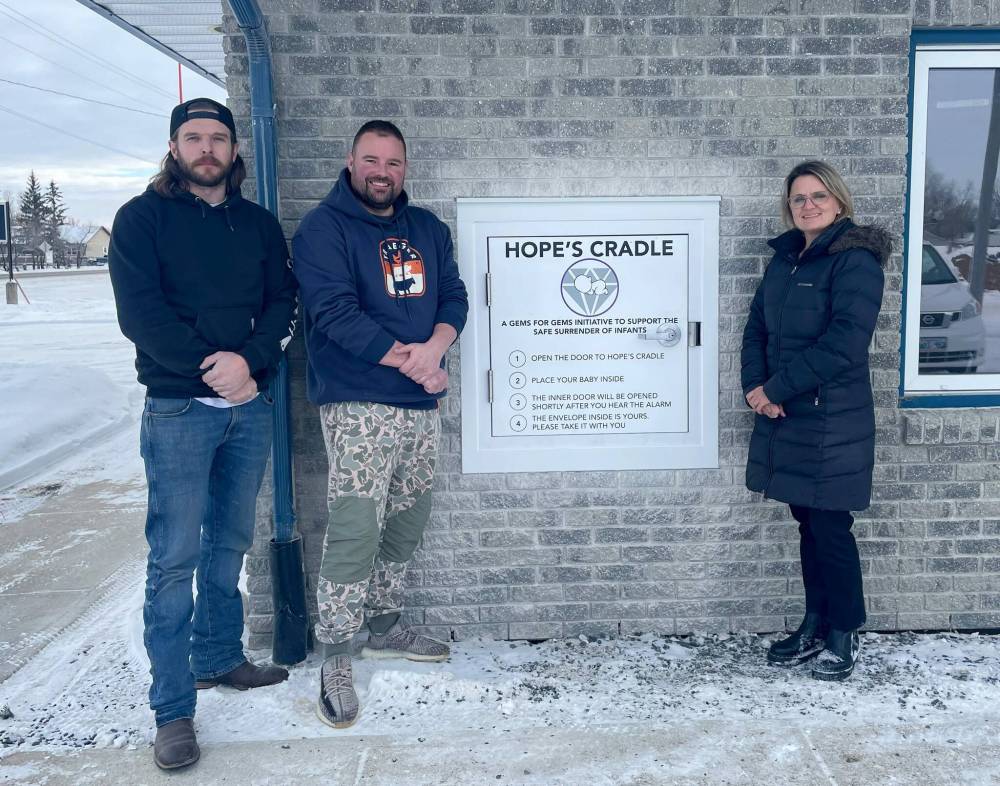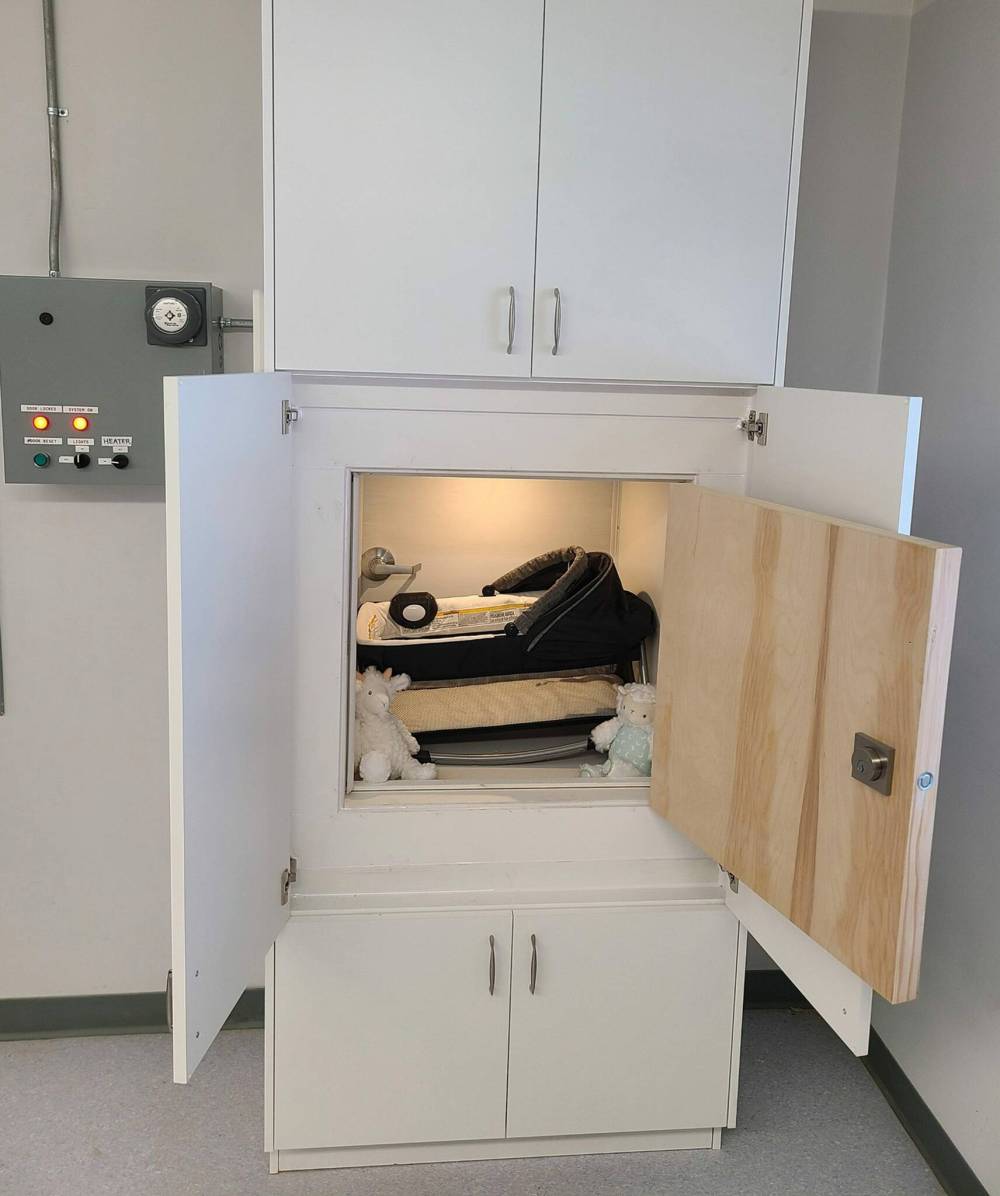Manitoba’s first infant surrender site set to open at rural fire station
Hope’s Cradle in Landmark district is designed for parents or caregivers to surrender a newborn baby anonymously
Advertisement
Read this article for free:
or
Already have an account? Log in here »
To continue reading, please subscribe:
Monthly Digital Subscription
$0 for the first 4 weeks*
- Enjoy unlimited reading on winnipegfreepress.com
- Read the E-Edition, our digital replica newspaper
- Access News Break, our award-winning app
- Play interactive puzzles
*No charge for 4 weeks then price increases to the regular rate of $19.00 plus GST every four weeks. Offer available to new and qualified returning subscribers only. Cancel any time.
Monthly Digital Subscription
$4.75/week*
- Enjoy unlimited reading on winnipegfreepress.com
- Read the E-Edition, our digital replica newspaper
- Access News Break, our award-winning app
- Play interactive puzzles
*Billed as $19 plus GST every four weeks. Cancel any time.
To continue reading, please subscribe:
Add Free Press access to your Brandon Sun subscription for only an additional
$1 for the first 4 weeks*
*Your next subscription payment will increase by $1.00 and you will be charged $16.99 plus GST for four weeks. After four weeks, your payment will increase to $23.99 plus GST every four weeks.
Read unlimited articles for free today:
or
Already have an account? Log in here »
Hey there, time traveller!
This article was published 29/01/2023 (1029 days ago), so information in it may no longer be current.
Manitoba’s first dedicated site where parents or caregivers can surrender a newborn baby anonymously is set to open at a rural fire hall, with more in the works.
While abandonment is rare, Hope’s Cradle — a small hatch on an exterior wall at the fire station in Landmark — is designed for mothers who feel they have no other option.
“It really is a last resort for women in very difficult circumstances,” said Susan Penner, executive director of Life Culture, a Steinbach-based non-profit which set up the site. “If you save one life, it’s already worth it.”

SUPPLIED
Susan Penner, executive director of Steinbach-based Life Culture, and Hope’s Cradle installation team members Zach Ronaldson, left, and Allan Ward stand next to the door of an infant surrender station at a fire hall in Landmark, Man.
The goal is to prevent death or dangerous abandonment, with the hope it will never have to be used.
The station, known as a baby box or hatch in other countries, could become active on or around March 4, if there are no glitches during testing.
After someone opens the door and places a baby in a bassinet, a silent alarm will alert the Rural Municipality of Tache’s volunteer fire department.
Fire Chief Allan Rau said a member will monitor the baby on a live video stream, while firefighters and paramedics respond.
The surveillance camera is pointed at the bassinet to ensure anonymity, he said.
The box is temperature-controlled and ventilated. The door locks when it is closed.
The person who leaves the baby is encouraged to take an envelope containing a medical information form for the baby, and details about their rights and post-partum care.
It also has a guided letter if the person wants to submit a message to the child.
Police will be contacted if abuse is suspected, said Penner.
After being checked by medical staff, the baby will enter the care of Child and Family Services.
The birth mother can seek to reclaim the child, said Penner.
Penner and Jordan Guildford, chief executive officer of Gems for Gems, which founded the Hope’s Cradle initiative, do not believe there is any grey area when it comes to the legality of leaving a baby.
They said it would be similar to surrendering a child in a hospital.
“We designed this to be as humane and kind to the baby and mother as possible,” said Guildford.
According to the Criminal Code, a person who endangers a child through abandonment could receive a jail or prison sentence if convicted.
Manitoba RCMP deferred comment to the province.
A Manitoba government spokeswoman said CFS staff are ensuring the program meets child protection legislation and practices.
There is no legislation permitting or forbidding an infant surrender station in Manitoba, the spokeswoman said.
Life Culture pursued the initiative after a newborn girl was found dead in a garbage bin in Winnipeg in June. Charges, including manslaughter, against a woman identified as the mother were stayed.
Penner contacted Gems for Gems, which opened the first Hope’s Cradle at a fire station in Strathmore, Alta., in December 2021, and found a partner in Tache’s fire department.
Life Culture collected $20,000 in private donations to install the station in Landmark. Home to about 1,300 people, the community is about 25 kilometres southeast of Winnipeg.
Gems for Gems, a Calgary-based non-profit which helps domestic abuse survivors, is in talks to possibly open three more sites in Manitoba, said Guildford.
She declined to reveal the locations. She would not say if a baby has been left at the Strathmore site.

SUPPLIED
Infant surrender station at a fire hall in Landmark, Man.
In 2012, the United Nations Committee on the Rights of the Child called for a ban on baby boxes. It expressed concerns the practice could interfere with a child’s right to know their birth parents.
Penner and Guildford do not see access to adoption or family history being an issue in Manitoba. The province declined to comment.
Prof. Neil McArthur, director of the centre for professional and applied ethics at the University of Manitoba, said the concept, which dates to medieval times, is more common in the U.S. states where abortion access is restricted.
He said there isn’t a lot of data on whether the sites are an effective means of preventing babies from death or being abandoned in other places.
That said, the sites aren’t a bad idea because they could save a life, McArthur noted.
He said the sites must be part of a larger system that protects vulnerable pregnant women and girls.
There are 134 active baby boxes in the U.S., according to an Indiana-based group called Safe Haven Baby Boxes.
The organization, founded in 2015, said 23 babies have been safely surrendered at its drop-off locations.
There are only a handful of sites in Canada, including three at Catholic-run hospitals — one in Vancouver and two in Edmonton.
The Angel’s Cradle program at Paul’s Hospital in downtown Vancouver began in 2010.
There have been two drop-offs since then, but none in recent years, said Shaf Hussain, a spokesman for Providence Health Care, the hospital’s operator.
Vancouver police do not pursue the parents unless abuse is suspected, he said.
Paige Mason, president of the Abortion Rights Coalition of Canada, said the priority must be on efforts to provide more resources to expectant mothers and address root causes such as poverty or domestic abuse.
She doesn’t want baby boxes to become normalized.
“They should only be used in very extreme situations,” she said.
Baby boxes in the U.S., where safe haven laws vary by state, are commonly affiliated with anti-abortion groups, according to Mason.
While Life Culture opposes abortion, Penner said the initiative in Landmark is strictly aimed at helping women or girls in difficult circumstances.
“This is not a political abortion debate,” she said, noting people on both sides of the issue are supportive of baby boxes.
chris.kitching@freepress.mb.ca
Twitter: @chriskitching

Chris Kitching is a general assignment reporter at the Free Press. He began his newspaper career in 2001, with stops in Winnipeg, Toronto and London, England, along the way. After returning to Winnipeg, he joined the Free Press in 2021, and now covers a little bit of everything for the newspaper. Read more about Chris.
Every piece of reporting Chris produces is reviewed by an editing team before it is posted online or published in print — part of the Free Press‘s tradition, since 1872, of producing reliable independent journalism. Read more about Free Press’s history and mandate, and learn how our newsroom operates.
Our newsroom depends on a growing audience of readers to power our journalism. If you are not a paid reader, please consider becoming a subscriber.
Our newsroom depends on its audience of readers to power our journalism. Thank you for your support.

